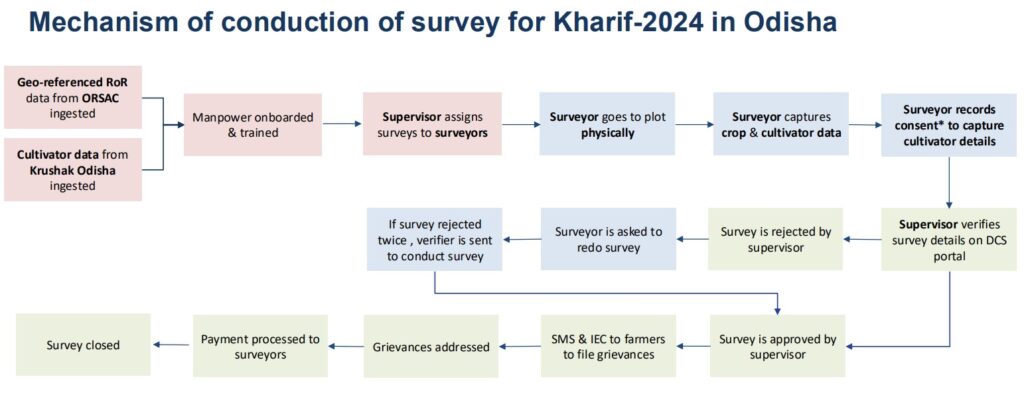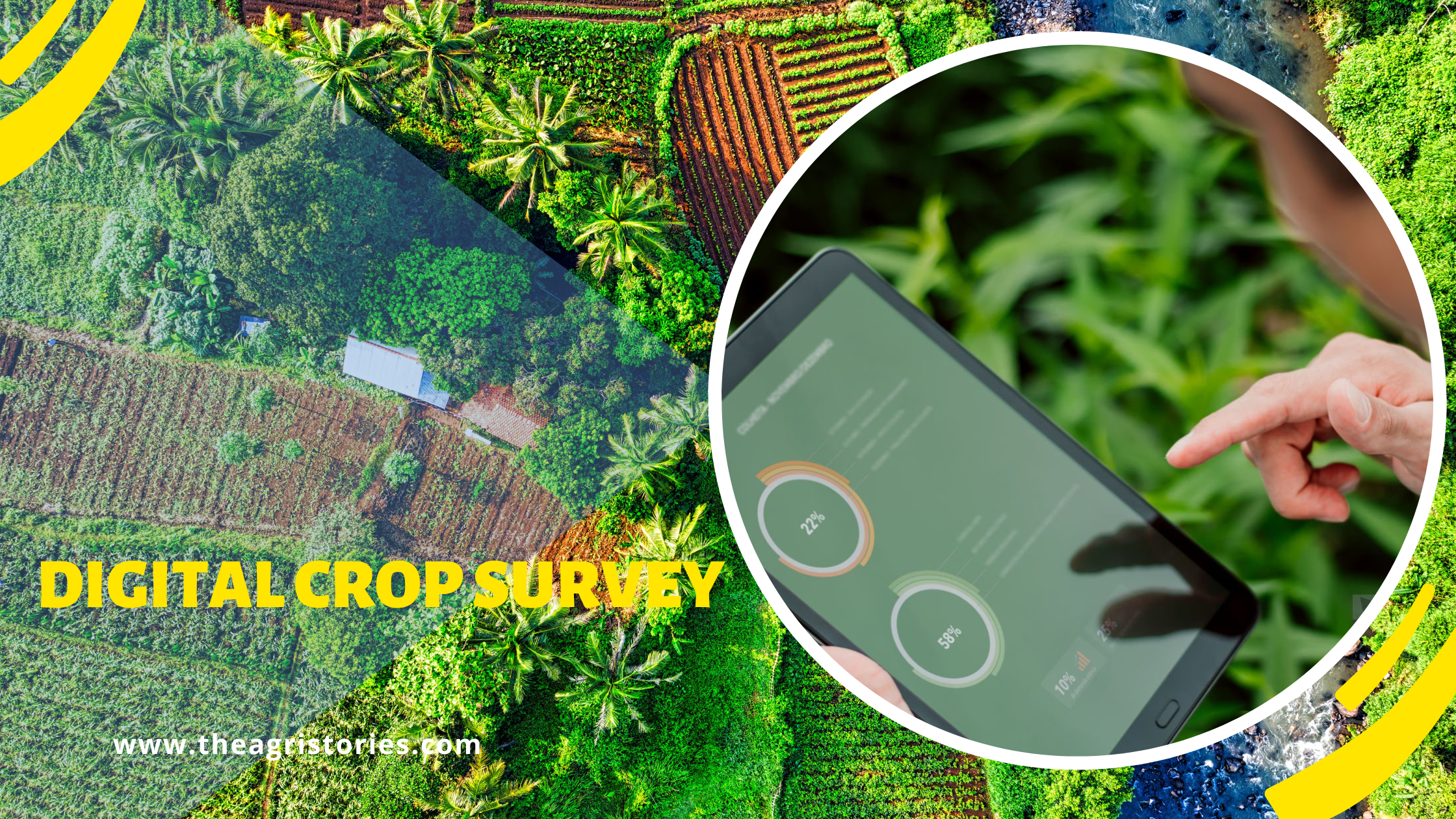Digital Crop Survey in Odisha:
Agriculture has always been the backbone of Odisha’s economy, providing livelihoods for a majority of the state’s population. However, despite its critical importance, the sector has faced numerous challenges, including inaccurate data collection, inadequate advisory services, and inefficiencies in scheme implementation. The introduction of the Digital Crop Survey (DCS) during the Kharif 2024 season marks a pivotal step towards addressing these issues. This initiative promises to revolutionize the way agricultural data is collected, verified, and utilized, ultimately benefiting the farmers of Odisha in multiple ways.
Understanding the Digital Crop Survey:
The Digital Crop Survey is a cutting-edge initiative aimed at capturing detailed and accurate data about the crops grown on each farm plot across Odisha. Unlike traditional methods of data collection, which often relied on estimations and infrequent inspections, the DCS employs a more rigorous and technology-driven approach. Each farm plot is inspected physically and verified through geo-tagged, time-stamped photographs, ensuring the authenticity and accuracy of the data collected.
The primary objective of the Digital Crop Survey is to create a single, verified source of truth for crop data. This unified data source will be accessible to all relevant government departments and private stakeholders, enabling them to make informed decisions and provide targeted services to farmers. By capturing data seasonally, the DCS ensures that the information remains up-to-date and reflects the actual conditions on the ground.
Immediate Benefits for Farmers:
One of the most significant advantages of the Digital Crop Survey is the immediate improvement in the quality and accuracy of agricultural data. This enhanced data quality has several immediate applications that directly benefit farmers.
1. Improved Land & Crop Data: The DCS will significantly enhance the accuracy of land and crop data stored in platforms like Krushak Odisha. This improvement will enable more precise and efficient management of agricultural resources, ensuring that farmers receive the support they need based on accurate information. With better data, government schemes and initiatives can be tailored to meet the specific needs of different regions and crop types, leading to more effective resource allocation and better outcomes for farmers.
2. Personalized Advisory Services: The Ama Krushi Advisory service, which provides farmers with critical information and guidance on crop management, will benefit immensely from the data collected through the DCS. With access to accurate, plot-specific data, the advisory services can be personalized to meet the unique needs of each farmer. This level of customization will help farmers make better decisions, optimize their crop yields, and reduce the risk of crop failure.
3. Simplified Crop Loan Processing: The data collected through the DCS will also streamline the process of obtaining crop loans from institutions like the Odisha State Cooperative Bank (OSCB). With accurate and verified data available through platforms like Krushak Odisha, the loan approval process can be expedited, reducing the time and effort required for farmers to secure the financial support they need. This ease of access to credit will enable farmers to invest in better inputs and technologies, ultimately improving their productivity and income.
Related Post: Revolutionizing Agricultural Credit in Odisha: How SAFAL is Empowering Farmers with Seamless Loan Access
4. Enhanced Scheme Strategy: Government schemes aimed at supporting farmers often rely on accurate data to design effective strategies. The Digital Crop Survey will provide a robust foundation for these schemes, ensuring that they are based on reliable information. This will lead to better-targeted interventions, more efficient use of resources, and improved outcomes for the farming community. With enhanced data quality, the government can develop strategies that address the specific challenges faced by farmers in different regions, leading to more equitable and effective support.
Long-term Impact of Digital Crop Survey:
While the immediate benefits of the Digital Crop Survey are significant, its long-term impact on the agricultural sector in Odisha is even more profound. The data collected through the DCS will enable a range of advanced applications that can transform the way agriculture is practiced in the state.
1. Precision Agro-Advisories: By linking the data from the Digital Crop Survey with satellite imagery and other advanced technologies, it will be possible to provide farmers with precision agro-advisories. These advisories will offer highly accurate and location-specific recommendations on crop management, irrigation, fertilization, and pest control. This precision farming approach will help farmers optimize their inputs, reduce waste, and increase their yields, contributing to sustainable agricultural practices.
2. Personalized Services at the Farm Plot Level: The detailed data collected through the Digital Crop Survey will allow for the personalization of services at the farm plot level. This means that farmers will receive tailored support and resources based on the specific conditions of their plots, such as soil type, crop type, and local weather patterns. This level of personalization will help farmers achieve better results and improve their overall productivity.
3. Monitoring & Evaluation of Government Programs: The DCS will play a crucial role in the monitoring and evaluation of government programs. With accurate and up-to-date data available, the government can track the progress of various initiatives, assess their impact, and make necessary adjustments to improve their effectiveness. This data-driven approach will lead to more efficient and transparent governance, ensuring that resources are used effectively to benefit the farming community.
4. Customized Insurance and Credit Products: In the future, the data collected through the DCS could be used to develop customized insurance and credit products for farmers. For example, insurance premiums and interest rates could be tailored to the specific risks and conditions of each farm plot, providing farmers with more affordable and relevant financial products. This customization will help farmers manage their risks more effectively and ensure that they have access to the financial resources they need to grow their businesses.
Unified Digital Infrastructure for Farmers:
The Digital Crop Survey is also a key component of a broader effort to create a unified digital infrastructure for farmers in Odisha. This infrastructure will include several integrated systems that streamline access to services and support for farmers.
1. Unified Decision Support System: A Unified Decision Support System will be developed to provide government officers with a single portal through which they can access all relevant data and tools. This system will enable more informed decision-making and ensure that resources are allocated efficiently to support farmers.
2. Unified Farmers’ Portal: A Unified Farmers’ Portal will be created, providing farmers with a one-stop shop for all their data and services. Through this portal, farmers will be able to access information about their land and crops, apply for government schemes, and receive personalized advisory services. This streamlined access to services will make it easier for farmers to get the support they need to succeed.
3. Standardized Payment Layer: The DCS will also contribute to the development of a standardized payment layer, which will facilitate the transfer of subsidies and other financial support to farmers. This system will ensure that payments are made quickly and accurately, reducing delays and minimizing the risk of errors.
Next Steps for Digital Crop Survey Implementation:
The successful implementation of the Digital Crop Survey during Kharif 2024 will require careful planning and coordination. Several key steps have been identified to ensure the smooth rollout of this initiative.
1. Capturing Cultivator Data: One of the next steps for the DCS is to capture the names of crop cultivators to maximize the use-cases of the data collected. This information will be essential for ensuring that the data is accurate and can be used to provide personalized services to farmers.
2. Data Integration: Data from Krushak Odisha will be integrated into the DCS, ensuring that even unregistered farmers can be included in the survey. This integration will ensure that the DCS provides a comprehensive view of the agricultural landscape in Odisha.
3. Customizing the GoI App: The Government of India reference app will be customized to meet the specific needs of Odisha, such as using blocks as units instead of sub-districts. A contextual payment module will also be developed to streamline the payment process for farmers.
4. Public Dashboard & Grievance Redressal: A public dashboard will be created to allow farmers to view the results of the DCS and raise issues if necessary. A grievance redressal option will be enabled to ensure that farmers’ concerns are addressed promptly.
5. Support Mechanism: An in-house team will be established at Krushi Bhawan to resolve any queries or issues that arise during the implementation of the DCS. Additionally, nodal officers from the Department of Agriculture and Farmers’ Empowerment (DAFE) and the Revenue & Disaster Management (R&DM) department will be available to assist with any issues.

Conclusion:
During Kharif-2024, 3,87,93,824 plots will be surveyed under the Digital Crop Survey in Odisha. The Digital Crop Survey represents a significant step forward in the digitalization of agriculture in Odisha. By providing accurate, up-to-date, and verified data, the DCS will enable more personalized and effective services for farmers, helping them to achieve better outcomes and improve their livelihoods. With its immediate and long-term benefits, the DCS is poised to transform the agricultural sector in Odisha, paving the way for a more sustainable and prosperous future for the state’s farmers.
Author: Tapas Chandra Roy, Block Agriculture Officer, DA&FE, Govt. of Odisha. Documenting and disseminating success stories of farmers to inspire millions of farmers across India.
If you wish to submit any inspiring stories of farmers, you can send them to this email address: [email protected]. Please ensure your submission includes a Word document and high-resolution photographs.

